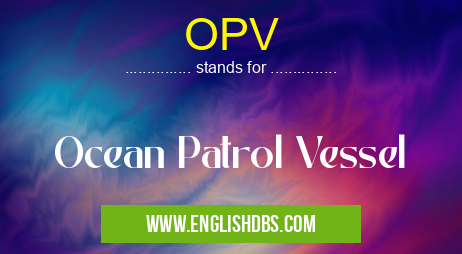What does OPV mean in UNCLASSIFIED
OPV, or Ocean Patrol Vessel, plays a crucial role in maintaining maritime security and enforcing maritime laws in coastal and offshore waters. These vessels are designed for extended patrols, surveillance, search and rescue operations, and other law enforcement duties.

OPV meaning in Unclassified in Miscellaneous
OPV mostly used in an acronym Unclassified in Category Miscellaneous that means Ocean Patrol Vessel
Shorthand: OPV,
Full Form: Ocean Patrol Vessel
For more information of "Ocean Patrol Vessel", see the section below.
OPV Meaning
OPV stands for Ocean Patrol Vessel, a type of ship specifically designed for patrolling and enforcing laws in coastal and offshore waters.
Functions of OPV
- Surveillance and Patrolling: OPVs conduct routine patrols to monitor maritime activities, deter illegal operations, and respond to suspicious vessels.
- Law Enforcement: They enforce maritime laws, including fisheries regulations, customs and border control, and anti-smuggling measures.
- Search and Rescue: OPVs are equipped to conduct search and rescue operations for distressed vessels and individuals in distress at sea.
- Maritime Security: They contribute to regional maritime security by preventing and responding to threats such as piracy, terrorism, and illegal trafficking.
Capabilities of OPV
OPVs typically possess the following capabilities:
- High speed and maneuverability for effective patrolling and pursuit
- Long endurance for extended patrols
- Advanced surveillance systems for detecting and tracking targets
- Armed with light weapons for self-defense and law enforcement purposes
- Equipped with rescue equipment and facilities for search and rescue operations
- Capable of operating in various sea conditions
Essential Questions and Answers on Ocean Patrol Vessel in "MISCELLANEOUS»UNFILED"
What is an Ocean Patrol Vessel (OPV)?
An Ocean Patrol Vessel (OPV) is a type of naval vessel primarily designed for coastal and offshore patrol, surveillance, and law enforcement missions. OPVs are typically employed by coast guards, navies, and other maritime law enforcement agencies.
What are the primary roles of an OPV?
Common roles of OPVs include:
- Maritime surveillance and monitoring
- Fisheries protection
- Border and coastal patrol
- Search and rescue operations
- Law enforcement and interdiction
- Environmental protection and pollution response
What are the key characteristics of an OPV?
Key characteristics of OPVs may include:
- Medium to large size, typically ranging from 50 to 120 meters in length
- High endurance and long range capabilities
- Advanced sensor and radar systems for situational awareness
- Ability to accommodate helicopters and unmanned aerial vehicles (UAVs)
- Armament for self-defense and law enforcement purposes
- Comfortable living and working accommodations for crew
Who operates OPVs?
OPVs are operated by a variety of maritime organizations, including:
- Coast guards
- Navies
- Customs and border patrol agencies
- Fisheries and wildlife protection agencies
- Environmental protection organizations
What are the advantages of using OPVs?
Advantages of using OPVs include:
- Enhanced maritime security and law enforcement
- Improved protection of fisheries and marine resources
- Enhanced search and rescue capabilities
- Increased environmental protection
- Versatility for a range of missions
Final Words: Ocean Patrol Vessels (OPVs) are essential assets for maintaining maritime security and enforcing maritime laws. Their diverse capabilities enable them to perform a wide range of duties, including surveillance, law enforcement, search and rescue, and maritime security operations. OPVs contribute significantly to protecting coastal and offshore waters, ensuring the safety and well-being of maritime communities and activities.
OPV also stands for: |
|
| All stands for OPV |
